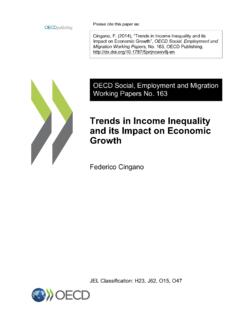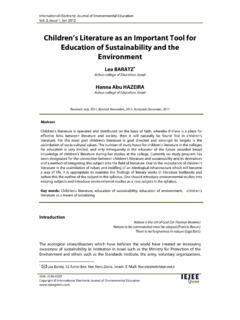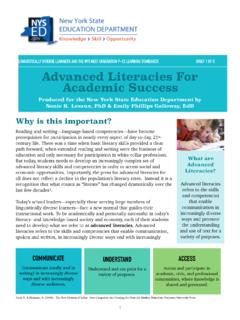Transcription of Food teaching in primary schools - GOV.UK
1 Food teaching in primary schools : A framework of knowledge and skills Food teaching in primary schools : A framework of knowledge and skills About Public Health England Public Health England exists to protect and improve the nation's health and wellbeing, and reduce health inequalities. It does this through world-class science, knowledge and intelligence, advocacy, partnerships and the delivery of specialist public health services. PHE is an operationally autonomous executive agency of the Department of Health. Public Health England Wellington House 133-155 Waterloo Road London SE1 8UG Tel: 020 7654 8000 Twitter: @PHE_uk Facebook: Prepared by: British Nutrition Foundation for Public Health England Crown copyright 2015 You may re-use this information (excluding logos) free of charge in any format or medium, under the terms of the Open Government Licence To view this licence, visit OGL or email Where we have identified any third party copyright information you will need to obtain permission from the copyright holders concerned.
2 Any enquiries regarding this publication should be sent to Published November 2015 PHE publications gateway number: 2015462 2 Food teaching in primary schools : A framework of knowledge and skills Contents Introduction 4 1. Developing professional competence 6 2. Taking a whole school approach 6 3. teaching the curriculum 6 4. Managing practical food classes 7 5. teaching food preparation and cooking (equipment, ingredients, food sources, functional characteristics, processes and skills ) 8 6. Designing, making and evaluating food 9 7. Promoting and applying nutrition 9 8. Applying aspects of consumer awareness (food origin, food choice, food labelling) 10 9. Implementing good food safety and hygiene 10 Further information 11 Appendix 1: Needs analysis audit 12 Appendix 2: skills 15 3 Food teaching in primary schools : A framework of knowledge and skills Introduction This framework is a guide to the knowledge and skills expected of primary school teachers who teach children about food.
3 It outlines the knowledge and skills that would be developed over time resulting in exemplary food teaching . The aim is to help primary schools implement the requirements for food within the new National Curriculum for Design and Technology (D&T) in England and the Core Competences for Children and Young People aged 5 to 16 years. These curriculum measures, together with the other action points of the School Food Plan, seek to promote a 'pro-food' ethos in schools and heighten awareness of the integral part that food and a whole school approach plays in children's health, wellbeing and attainment. School food provision and how children keep themselves healthy will be monitored by the Office for Standards in Education, Children s Services and skills (Ofsted) from September 2015 as part of the new Common Inspection Framework.
4 The framework can be used to: review and plan courses for trainee teachers, and set out expectations for qualified teacher status audit current practice by existing teachers, supporting performance-related development support professional reviews with colleagues plan and run professional training courses to support best practice The framework: sets standards, expectations and requirements for qualified teachers teaching food in primary schools highlights key areas for development, presented in a manageable, easy to convey way with clear expectations provides aspirational goals which will be developed over time (describing accomplished food teaching ) stipulates distinctive descriptions of food teaching , rather than generic teaching standards (which they may be used alongside) The framework is presented in nine sections: 1.
5 Developing professional competence 2. Taking a whole school approach 3. teaching the curriculum 4. Managing practical food classes 5. teaching food preparation and cooking 4 Food teaching in primary schools : A framework of knowledge and skills 6. Designing, making and evaluating food 7. Promoting and applying nutrition 8. Applying aspects of consumer awareness 9. Implementing good food safety and hygiene The stem for each section starts with When teaching , accomplished teachers .. The term accomplished is used to describe a highly trained or skilled professional in a particular activity. Acknowledgments: Public Health England (PHE), along with the British Nutrition Foundation (BNF), initiated the development of this framework in response to a meeting comprising the BNF, the Food Teachers Centre, Ofsted, the Department for Education and the School Food Plan to discuss the management and provision of food teaching .
6 All participants felt that guidelines would be of benefit to support teachers who deliver food teaching in schools . With thanks to: Alison Stafford, Healthy schools London Daniel Walsh, The Campion School Denise Maiden, Highworth Grammar School Elizabeth Tydeman, Public Health England Frances Meek, British Nutrition Foundation Hayley Wincott, Cromwell Community College Jane Sixthsmith, Focus on Food Jenny Elms, Consultant Kate Hufton, University of East London Kate Morris, The Purple Kitchen Kim Down, British Nutrition Foundation Louis levy , Public Health England Louise T Davies, Food Teachers Centre Rebecca Rylatt, Department for Education Richard Green, Design and Technology Association Roy Ballam, British Nutrition Foundation Sarah Grant, School Food Plan Sarah Quick, West Exe School Simon Gray, Food Teachers Centre Sue Wood-Griffiths, Institute of Education, University of Worcester Zainab Ali.
7 Department for Education 5 Food teaching in primary schools 1. Developing professional competence When teaching , accomplished teachers: Further their professional expertise by selecting appropriate professional development activities, such as observing experienced teachers, undertaking practical training in food skills or updating their subject knowledge (through face-to-face events and online training); Develop an action plan for professional development (based on a needs analysis audit) and how this will be applied in school; Ensure that they meet national standards for the subject, such as Level 2 Food Safety. 2. Taking a whole school approach When teaching , accomplished teachers: Contribute to whole school planning for food education. Work collaboratively with colleagues to enhance learning opportunities, secure consistency of key concepts and healthy eating messages (such as using the UK healthy eating model) and coherence (by sequencing when key concepts are taught across subjects, eg science, PSHE and physical education); Use their expertise to support the whole school approach to food and the development of policies, understanding the position of food education in the health and wellbeing agenda of the whole school and work with school caterers where appropriate; Use their food lessons to motivate change in behaviour, such as to influence uptake of healthier school lunch choices.
8 3. teaching the curriculum When teaching , accomplished teachers: Develop schemes of work that take account of current educational thinking, best practice, national policies and statutory requirements, for example, the national curriculum programme of study, advice from professional associations (such as the Design and Technology Association), School Food Plan, Ofsted guidance, Public Health England and current healthy eating advice; 6 Food teaching in primary schools : A framework of knowledge and skills Ensure that the range of food, ingredients and recipes studied come from the major food groups and reflect the recommended guidelines for a healthy diet; Set out a rationale for the scheme of work , including the aims, focus for each school year group, the anticipated starting point and differentiated learning outcomes for pupils, the key skills and knowledge that will be taught and the reason that these have been chosen.
9 Review expectations against a nationally published progression framework or similar; Communicate the aims and content of the scheme of work to a range of audiences, including parents/carers, other teachers and the pupils. Specify the key learning for each activity in terms of skills and knowledge rather than recipe or project; Articulate and justify the resources that will be required to teach the curriculum effectively and inclusively, such as budget for ingredients, equipment (including cooking facilities), and learning support; Develop an effective support network to provide a rich learning experience for learners, such as local food businesses, local chefs and food experts; Prepare or know where to access stimulating and up-to-date resources that support effective learning. 4. Managing practical food classes When teaching , accomplished teachers: Set up safe food preparation and cooking space in the classroom, and know how to get pupils ready to cook; Select and demonstrate appropriate teaching strategies during different stages of a practical lesson, such as spot demonstrations, individual support, group discussion review and tasting; Organise safe and successful tasting sessions; Use effective classroom systems for managing health and safety (such as cleaning and safe storage of ingredients and cooked dishes, allergens), resourcing practical work (such as shopping) and maintenance of equipment.
10 Contribute to risk assessments; 7 Food teaching in primary schools : A framework of knowledge and skills Act as role models of good practice for food storage, handling, preparing, cooking and serving food and drinks, including the safe use of equipment; Brief all those that work alongside them in the food classroom in the necessary systems and processes, eg teaching assistants, parents and carers. 5. teaching food preparation and cooking (equipment, ingredients, food sources, functional characteristics, processes and skills ) When teaching food, accomplished teachers understand how children learn key concepts and skills , and use age/ability appropriate teaching strategies that engage learners, challenge a range of abilities, and build confidence and independence. When teaching , accomplished teachers: Name, taste and prepare a broad range of ingredients and healthy recipes, reflecting cultural diversity; Exhibit a high level of competence in a wide range of food skills and demonstrate these for effective learning (Appendix 2: skills ); Select and use an appropriate range of small equipment, safely and efficiently; Show awareness of their own safety and of those around them when handling food and equipment.
















